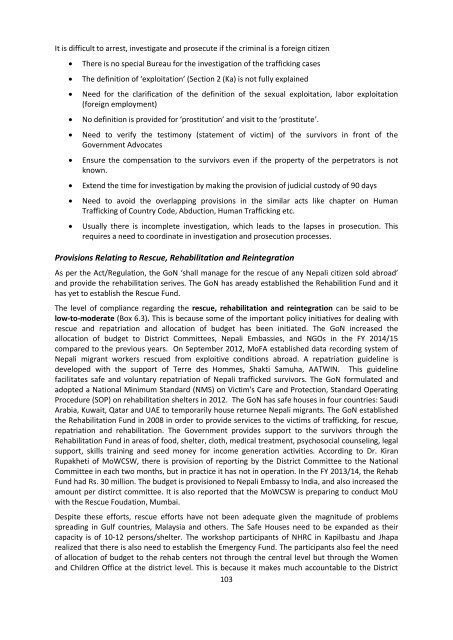TRAFFICKING IN PERSONS
397604438Trafficking_in_Persons_National_Report_2013-15
397604438Trafficking_in_Persons_National_Report_2013-15
You also want an ePaper? Increase the reach of your titles
YUMPU automatically turns print PDFs into web optimized ePapers that Google loves.
The HTTCA 2007 (Sec 17) has the provision of compensation to the victims of at least one half of the<br />
amount fined to the offender. However, NJA (Op. cit., 2013) analysis of the 16 court judgments<br />
revealed that in majority of cases such fine was not awarded. If they are awarded, it was difficult to<br />
compensate in a real sense because the traffickers may or may not have the property to<br />
compensate. In this connection, it is recommended by the studies that compensation to the<br />
survivors should be provided by the State. The workshops’ participants of NHRC suggested that it is<br />
essential to clearly state the responsible body for providing the amout of comensation. Many<br />
participants perceive that comensation should be distrbituted through the Women and Children<br />
Office and some participants also reported that compensation amount should be provided by<br />
visiting house-to-house.<br />
Box 6.4 Provisions relating to punishment and compensation<br />
Provisions in the Act/Regulation<br />
Sec 15, Punishment: provides for varying degrees<br />
of punishment depending on the nature of the<br />
crime. The maximum punishment is 20 years of<br />
imprisonment and a fine of Rs. 200,000. The<br />
degrees of punishment also vary depending on the<br />
relationship of the offender to the victim.<br />
Sec 17, Compensation: provides that a victim shall<br />
be given compensation of at least one half of the<br />
amount fined to the offender<br />
Government’s level of compliance<br />
Low-to-moderate: Of the 22 cases that were<br />
monitored between September 2012 and June 2013<br />
in which the accused were convicted, most were<br />
sentenced to between 10 and 20 years, and fined<br />
Rs. 100,000 to Rs. 200,000.<br />
105<br />
Low-to-moderate: Of the 22 cases analyzed by<br />
FWLD, in 6 cases compensation was not given. Of<br />
these cases, in 3 compensation was not requested.<br />
It is said that victims are not aware about this<br />
provision of compensation. On the other hand, the<br />
Supreme Court ordered the GoN to establish the<br />
Compensation Fund for the victims who are entitiled<br />
to receive the compensation under the Section 17.<br />
Provisions Relating to Others<br />
It can be inferred from the findings of the studies (Op.cit., FWLD, 2014; NJA, 2013 and Kunwar, 2014)<br />
that Government of Nepal’s compliance in relation to provisions of awards for the informants,<br />
maintaining confidentiality of the witness, formation of committees, providing security to the victims<br />
or witness during the entire investigation, prosecution and adjudiction processes and in-camera<br />
hearing can be termed as low-to-moderate.<br />
The MoWCSW has initiated awarding the individuals and institutions who have outstanding<br />
contribution to fight against TIP since the FY 2013/14 and 2014/15 as discussed in Chapter 5. Some<br />
media persons, government staff, Police were awarded in the eighth and ninth anti-trafficking<br />
National Days (Bhadra 20, 2071 and Bhadra 20, 2072). However, there is no evidence of the court<br />
decisions that informants of the trafficking crime shall be awarded from the Rehabilitation Fund.<br />
Studies indicated that the confidentiality of the victim is being secured but the confidentiality of the<br />
informant is not. Of the 22 decisions analyzed by FWLD, 19 survivors’ confidentiality was maintained<br />
through pseudonyms or codes, and 3 survivors’ real names were used. These cases were registered<br />
before the 2007 i.e. before the enforcement of HTTA 2007. In all cases after 2007, the survivors were<br />
given pseudonyms or codes. Whereas in the study of NJA (Op. cit., 2013) 120 Supreme Court<br />
judgements of trafficking cases, in 19 judgements the confidentiality of the survivors were not<br />
maintained: their real name and caste, address were maintained. The Supreme Court Guideline 2064<br />
on maintaining confidentiality of the survivors states that the confidentiality of the survivors must be<br />
maintained in special crime cases such as rape, sexual exploitation, people living in HIV/AID.<br />
The achievement can be termed as moderate in relation to formation of committees. An inter<br />
Ministerial National Committee on Controlling Human Trafficking (NCCHT) has already been formed.<br />
The Committee is represented by both GOs and NGOs. A Secretariat for NCCHT was formed in 2011


